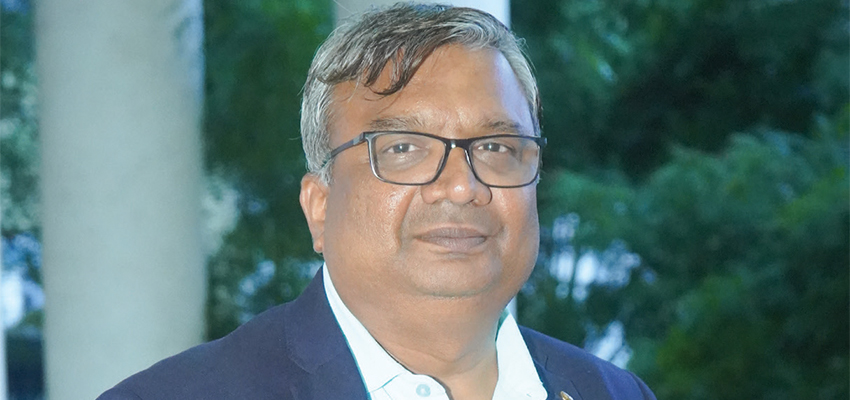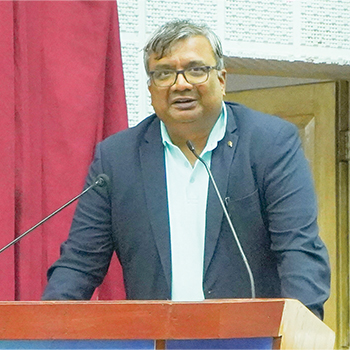HR with Empathy and Empowerment

While empathy has recently gained importance in the HR world, Sudhir Mateti, Head of Human Resources, Syntel Telecom, has been practicing it for years. This is precisely why empowering people is central to his job profile. His dream is big—a dream that doesn't let him sleep— work on the overall development of rural students from the grassroots level and create a future battalion of promising leaders who can make a difference. With this noble thought, he is out to conquer his dream. In a conversation with Corporate Citizen, Mateti talks about his growing-up days, why empathy isn't new for him, his mission, employee attire and demeanour, and much more
Corporate Citizen: Give our reader a brief background of yourself.
Sudhir Mateti: I hail from Andhra Pradesh and was born in Mumbai. I spent most of my life around the country, with a primary focus on Mumbai and Pune. My father was an ex-Air Force officer, and my mother was a housewife. They are the ones who moulded me into the person I am today. I have three siblings, each excelling in their respective fields. Their success has taught me that humility and family go hand in hand, which has been monumental in my corporate journey.
Being human—raised with the paramount virtue of humanity and compassion, I find myself navigating this industry with a greater sense of understanding. This has led me to place a high value on life skills and a positive attitude. I am extremely sensitive and empathetic to human needs, expectations, aspirations, and challenges. "Being Humane" is my philosophy. In simple terms, it’s nice to be an important human, but it's more important to be a nice human.
I am a people person, dedicated to making a difference. I wear many hats - mentor, motivational speaker, counsellor, life coach, student, strategist, and social change enthusiast. I'm always eager to contribute to social causes.
My professional success comes from connecting with the person behind the role, helping individuals uncover their strengths and overcome their weaknesses, and fostering a positive self-image.
"My philosophy is to always keep giving without thinking of what I will get. This leads to a feeling of fulfillment and peace, which is my ultimate goal"
— Sudhir Mateti
CC: It is said that the place you're born and raised in shapes you as a person. How would you say that your hometown has shaped you to become a better person or a better corporate professional?

Though my roots are in Andhra Pradesh, Mumbai has truly shaped me. This bustling city has influenced me profoundly. The fast pace and resilient spirit of Mumbai’s citizens have left a lasting impact, especially during challenging times.
Growing up in a predominantly Gujarati colony in Mumbai, I was immersed in a culture of business and community. This environment taught me valuable lessons about entrepreneurship, peace, and the joy of food. These experiences shaped my perspectives and laid the foundation for my personal values.
My parents instilled in me the importance of picking the best from our surroundings and focusing on meaningful learnings. Mumbai has taught me to handle challenges and work towards greater goals with determination and resilience.
CC: What fascinated you about HR?
Growing up, I didn't excel in academics, but a friend once taught me some basics in a few minutes, helping me clear difficult exams. In the ninth grade, I realised that if I could train people using simple, clear language and help them succeed academically, I would be doing a great job. So, even at that young age, I decided to become a training faculty member.
From that moment, my journey as a trainer began. Inch by inch, as I served people, I transitioned into a generalist role, which eventually led me into HR.
CC: You have 26 years of experience in the corporate world. You have seen many hues of the corporate world, how you still manage to be so humble and down-to-earth?
Like I said, that is how I was raised - to be more human. Well, I don't know, whether I'm humble or down-to-earth. What I do know is - I'm human, and I strive to stay true to my humanity every day.
CC: That’s a great philosophy to live by. Moving on, can you sum up your 26 years of career for us?
I began my career as a trainer, and later ventured into the travel and tourism industry by starting my own travel agency. In the early days, I worked for a few small companies, learning the fundamentals and basics before moving into the corporate world.
My corporate journey was challenging. I often reported to younger bosses, many of whom were highly successful graduates from prestigious institutions like IIT and XLRI. This led to differences in operational styles. However, I always focused on extracting the merit from every situation, regardless of how it was presented. Whether the feedback was harsh or gentle, I sought out the valuable lessons within it. This attitude of finding the good in every experience, learning from it, and practicing it daily has brought me to where I am today. I'm not sure if this is a success story or just my story, but it has shaped who I am.
CC: What is best piece of corporate advice you've ever received?
The most impactful corporate advice that ever I received came early in my career when I became an assistant manager. At that time, I was young and enthusiastic about my career. As a first-time manager, I was full of energy, and most of my dialogues were centered around "I". My manager noticed this and advised me to substitute "I" with "We" to be more successful. This advice led me to reflect on my communication, even though my intentions were always team-oriented. That transformation in language, which happened way back in 2002, became an instrumental piece of advice that shaped my professional journey.
CC: Tell us about your current role at Syntel.
I am the Head of HR at Centre, overseeing everything in the HR domain—from employee engagement and compliance to budgeting, performance management, and training and development. My role encompasses a wide range of responsibilities.
One milestone, I'm proud of is that next month, I will complete 15 years at the Centre. Over these years, I've seen the company grow exponentially in both size and employee numbers, with a tenfold increase. I played a key role in handling three mergers and acquisitions during this time, contributing significantly to our growth journey.
CC: What is one of the biggest challenges you faced in your career and how did you overcome it?
One of my biggest ongoing challenges has been gathering the courage to communicate critical information to management. It's never easy, but I consistently approach it with careful etiquette, protocols and respect. Bringing operational challenges to light, ensuring management is informed, and taking timely corrective actions, have been crucial aspects of my role. This challenge defines my journey and meeting it head- on is key to my approach.
CC: How do you incorporate empathy in HR, especially when it is a top priority for companies today?
Incorporating empathy into HR, especially as it becomes a top priority for companies today, is deeply rooted in the lessons my mom taught me in my early days. The values instilled by my parents have shaped who I am, making empathy a natural part of my personality. While empathy is increasingly talked about these days, I've been practicing it for three decades. It's not just a skill I apply at work; it's woven into how I approach every interaction and decision.
CC: Tell us more about the rural student development project.
So, this answer begins with a story. I have a dream that never lets me sleep, a dream that can play a vital role in shaping the careers, aspirations, and lives of rural students.
When I started working on this dream I got to know that, in India, rural talents often lack the necessary support in terms of basic needs, resources, proper tools, learning opportunities, overall personality development, English language skills, industry exposure, internships, and job opportunity platforms—important is that I should work on.
We work with students from lower grade colleges, who often lack facilities and resources. Our goal is to teach them employability skills, polish their interviewing skills, train them in communication, and provide whatever is required for them to be selected. This includes attitude, skills, language proficiency, interview techniques, and campus recruitment skills.
We also help students design their careers, exploring what they want to become versus what they are and what they can become. We show them a roadmap, arrange interviews with various organisations, and try to help them secure jobs. Sometimes we are successful, sometimes not, but the effort has been ongoing for the last 18 years.
My mission — I wish to work on the overall development of rural students from the grassroots level and create a future battalion of promising leaders who can make a difference in their own lives and contribute to organisations and the nation. This mission includes developing rural faculty, enhancing mind-sets, attitudes and competencies.
I see rural students as untapped raw talent with the potential to form a strong workforce for the nation. Additionally, they possess the potential to generate numerous start-ups through entrepreneur development programmes with comprehensive support.
Skill Development Centres—I plan to establish ‘Skill Development Centres’ in rural areas for students and faculties, where we can identify and nurture talent to national and international levels.
"Despite the advancements in technology, I remain grounded in the values and systems I believe should be in place. I don't want policies to police people or proce- dures to constrain them. I prefer systems and processes that empower and help people grow"

Having worked as a motivational speaker, guest speaker, and visiting faculty for almost 10 years, I have been informally pursuing this dream and helping those I could. This has been my drive so far.
A man with a plan — I am now considering a structured approach with a team to scale faster and involve resourceful leaders in our journey to add more meaning and direction to this passionate purpose. I am confident and happy that I have found the purpose of my life.
CC: How do you handle Gen Z employees and their unique approach to attire and demeanour?
I strongly believe that what a person is on the inside is far more important than their external attributes. By this, I mean the attitude they bring. In my interviews, I assess candidates based on their attitude and value system. I present them with various difficult situations and their responses reveal their true character. This helps me determine if they are the right fit for my organisation. If they align with our values and culture, they are in; if not, they are not.
CC: Do you think employees should be given the freedom to wear whatever they want?
Yes, everyone should have the freedom to wear what they want, as long as it maintains a decent level of professionalism and does not dilute the culture of the organisation.
CC: How do you ensure continuous learning?
I teach and serve as a faculty as well, conducting various sessions every day. Each day, I make it a point to teach, enlighten others, and take something valuable back from them. Each teaching session requires thorough preparation and understanding of the material. My training is a significant part of my learning process. I dedicate about 120 minutes daily to learning on various subjects.
For instance, if I face the challenge of calculating the productivity of employees involved in multiple businesses. This requires a deep dive into the P&L of different businesses to understand the cost impact versus productivity of each employee. To address such challenges, I conduct detailed research and prepare extensively, using daily case studies to learn about different subjects.
Additionally, there are areas where I feel I haven't met my own high standards, despite others thinking I did well. In these cases, I research further to improve and aim for excellence. This continuous process of evaluation and improvement helps me learn and grow.
Currently, I am learning new languages. Over the last three years. I learned Urdu and can now deliver lectures in it. My next goal is to learn Chinese by the end of 2024. While my learning goals are ambitious, achieving even 20-30 per cent of them is a significant success for me.
CC: According to you, tell us some of the key trends that are emerging in HR?
Most people are talking about AI and analytics, which are the trending topics in HR. While we are using technology extensively, we often overlook the basic understanding of fundamental human needs. Despite the advancements in technology, I remain grounded in the values and systems I believe should be in place. I don't want policies to police people or procedures to constrain them. I prefer systems and processes that empower and help people grow. I'm always on the lookout for self-enabling systems and processes that foster growth and bonding rather than restrictions.
CC: You are a cyclist and into martial arts. Can you tell us more about that?
I started cycling and learning martial arts in school. I've cycled pan India and continue to cycle as a hobby. I became a black belt in martial arts in 1989 and taught it for a few years. My passion for sports has helped develop a sportsman spirit that I carry into my profession.
"I am now considering a structured approach with a team to scale faster and involve resourceful leaders in our journey to add more meaning and direction to this passionate purpose"
CC: You are also into motorsports.

My passion for motorsports ignited during my early years through bike riding and motor cross driving. Starting from local Mumbai street races, I gradually expanded into longer tours and competitive events, guided by a seasoned motorsport coach. While my performance in races was notable, the true value of my motorsport journey transcended the track. Attention to detail — One of the most impactful lessons I gleaned was the necessity of meticulous attention to detail—a skill crucial not only in motorsports but also in corporate settings. I learned that success relies on a combination of finely honed skills, a broad strategic vision, and precise execution. These insights have deeply influenced my approach to challenges, emphasising thorough planning and disciplined action.
In terms of inspiration, Michael Schumacher stands as a beacon. His remarkable career, marked by triumphs and resilience, including overcoming serious health challenges, underscores his legacy as a legend in motorsports. Schumacher's journey epitomises perseverance, leadership, and an unwavering commitment to excellence— qualities that continue to inspire my personal and professional endeavours, on and off the track.
CC: What are the corporate lessons you've learned from sports?
The lessons are common - be unbiased, fair, and avoid letting prejudices or anecdotal impressions influence decisions. Diagnose thoroughly before concluding, and always focus on the merit of the situation.
CC: What is your philosophy in life?
My philosophy is to always keep giving without thinking of what I will get. This leads to a feeling of fulfillment and peace, which is my ultimate goal.
CC: Any advice for aspiring HR leaders?
Think for the larger good, not just for yourself.
Srategic Thinking Vs Financial Acumen
The auditorium was filled with students and future corporate leaders, waiting to hear from Sudhir Mateti, Head of Human Resources at Syntel Telecom, at the campus of Sri Balaji University, Pune (SBUP). Sudhir’s session aimed at creating young leaders emphasising the importance of growth, self- awareness, and passion in career development and personal finance. Sudhir also highlighted education's role in simplifying complex decisions, strategic thinking over financial acumen, and the benefits of working in smaller organisations. Read on, the session is surely captivating

Sudhir struck the right chord with the students from the very beginning when he addressed the topic of the hour—pay packages. Most of us desire a handsome package from our first job itself, but Sudhir, with his experience, said, “Worship Goddess Saraswati, the goddess of knowledge and wisdom, wholeheartedly. In doing so, the Goddess of wealth (Lakshmi) will follow you.”
To reach such an attainment, students must follow a path that begins with self-awareness and an understanding of what they truly want. He said, "It's good to dream of having a successful pay package. Most of us aspire to become financial analysts, auditors, vice presidents, or other prestigious roles. One of the most common questions in interviews, whether you're a fresher or a seasoned professional is, 'Where do you see yourself in five or ten years from now?' The most common answer is usually a designation like CEO, COO, or vice president. When candidates give this answer, it reveals that they are chasing titles, respect, and growth that come with them."
He continued, "During interviews, when candidates are asked why they want to change jobs, the most common answer is growth. But this leads to a deeper question: What does growth mean to you? People often shy away from saying it directly relates to revenue, pay packages, or promotions," he added. "I see growth differently—the focus should be on knowledge and skills. This encapsulates the concept of ASK-Attitude, Skills, and Knowledge – and it's crucial to cultivate these qualities."
Education is the key
It goes without saying that harnessing the power of knowledge should be the cornerstone of every student's foundation. Sudhir said, “In my experience, especially during my years of observing people, I’ve learned that the objective of education is to simplify complex situations with straightforward decisions. Simple decisions often resolve the most complex issues, but they are not easy to come by without the right attitude, skills, and knowledge,” he added. “I often notice the attitudes of students and colleagues. Whether they are driving a car or participating in a group activity, their ability to handle situations reflects their ASK. For 27 years, I’ve been observing people from a broader perspective, and I’ve seen that those who excel can handle complex situations with ease. This is the ultimate goal of education—not just to master complicated subjects, but to resolve complex situations with simple and effective decisions."
Be the Master – know yourself
There are a few things to consider while designing one’s career – start by understanding yourself. To explain this further, Sudhir said, “For students, it’s important to identify their core passions, skills, and personality traits. This self-awareness will guide them in choosing a profession that aligns with their inherent strengths and interests, ensuring long-term satisfaction and success.”
Sudhir shared an anecdote to explain this, “When talking to students who specialise in R&D, finance, or other domains, a common response to why they chose their field is often, 'I'm interested in it.' The follow-up question should be, 'What made you interested in finance or HR?' For example, if someone says they're very talkative and a people person, they might think sales is a natural fit. However, there are thousands of professions where their skills can be utilised beyond just sales,” he said.
He believes that when designing one's career, it's crucial to first understand what you want in life, not just in your career. A career is only a part of life, intended to provide happiness, job satisfaction, and financial stability, but life encompasses much more than just a job. “I’ve reached my current position after 27 years of consistent effort, akin to sādhanā. It’s this dedication that has brought me success,” he said.
"In my experience, especially during my years of observing people, I’ve learned that the objective of education is to simplify complex situations with straightforward decisions"
The balance between the heart and brain

He had a strong opinion that there should be harmony between what you think, feel, and do. To simplify this, he explained, “In simpler terms, your interests and skills in one area can shape your career. For example, many people are drawn to fields that are currently thriving, like computer science or finance, often influenced by role models in those domains. But true career satisfaction and success come from aligning your interests, skills, and competencies.”
The key is to balance what you think (brain), what you feel (heart), and what you do. Often, people think with their hearts and feel with their brains, leading to choices based on interest rather than competence. So, it's essential to align your heart and brain to make decisions that are both passionate and practical. He said, “You have great skills in a particular subject, and you will most likely succeed if your interest aligns with it.” Further adding, “However, if your interest isn’t there, you will need to develop it, as interest can be cultivated. All those who are now great chefs started as subpar chefs. They faced criticism and made numerous mistakes. Their success comes from persistence despite these challenges. By continually learning from mistakes and perfecting their craft over thousands of dishes, they eventually mastered it. Criticism, rather than being a deterrent, was a key factor in their growth and improvement.”
The art of nothingness
People often confuse this statement - doing nothing is an art. It means that resting or not doing anything or being inactive - wholeheartedly, takes strength. Sudhir further explained, “If you want to do nothing, become an expert at it. Develop the ability for your brain to stop, not think, and do nothing— it's not easy. Whatever you do, strive for excellence. Whether you scribble on a piece of paper or make a policy, aim to be a subject matter expert. Mediocrity is not acceptable. With the right attitude, you will gain the necessary skills and knowledge.”
Find your purpose
Life comes full circle when you find your life's purpose. “It gives your life a meaning— something that we all yearn for,” he said. However, finding this purpose is not easy. One must explore various experiences to truly understand it. “The purpose of your life is to find a purpose. Once you find it, use your career, energy, activities, finances, and relationships to support it. Everything should revolve around your life’s objective, not just opinions,” he explained.
At the end of the session, Sudhir gave them a few thoughts to ponder on. The students were inspired and eager to connect with him to share their insights. It’s individuals like Sudhir who are transforming the field of HR with humility and empowerment, grooming young minds to ensure the future of HR is in capable hands. The enthusiastic applause confirmed that his teachings would not be forgotten, and that the torch of HR would be carried forward with renewed vigour.